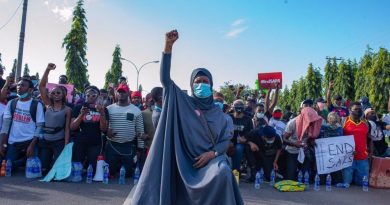Chinese Firm Moves To Takeover More Nigerian Properties After Presidential Jet Seizure
Zhongshan Fucheng Industrial Investment Co. Limited, the Chinese company that recently secured a court injunction to ground three Nigerian presidential jets in Europe, has expanded its legal efforts to seize more Nigerian assets in various countries around the world.
Documents obtained on Thursday reveal that the company has initiated legal proceedings in eight jurisdictions, including the United Kingdom, United States, Belgium, Canada, France, Singapore, and the British Virgin Islands.
According to Punch, these actions are part of Zhongshan’s ongoing efforts to enforce a $74.5 million arbitration award granted by an independent arbitral tribunal.
The award stems from a contractual dispute between Zhongshan and the Ogun State government regarding the development and management of the Ogun Guangdong Free Trade Zone.
The Federal Government of Nigeria has vowed to protect its foreign assets from what it described as “predators,” as the dispute continues to escalate on multiple fronts.
The recent seizure of Nigerian presidential jets, including a Dassault Falcon 7X and a Boeing 737, has already stirred significant controversy.
The dispute traces back to 2010 when Ogun State entered into a joint venture with Zhongshan’s parent company to develop an industrial park within the Ogun Guangdong Free Trade Zone.
However, the agreement was terminated in 2016, leading Zhongshan to file lawsuits seeking reinstatement of its contractual rights.
After exhausting legal options in Nigerian courts, Zhongshan pursued international arbitration, which resulted in the $74.5 million award in its favor.
Despite the award, the Ogun State government has yet to make the payment, prompting Zhongshan to pursue enforcement actions against Nigerian assets abroad.
The seizure of the jets was just one of several legal maneuvers undertaken by the company to recover the awarded funds.
In addition to targeting Nigerian presidential jets, Zhongshan has reportedly attempted to seize other assets, including a jet linked to former petroleum minister Dan Etete.
The Federal Government tracked down and grounded the luxury private jet, which was purchased with proceeds from the controversial $1.3 billion Malabu OPL245 oil deal.
The ongoing legal battle highlights the far-reaching consequences of disputes involving Nigerian subnational governments and foreign investors, with the potential to affect national assets on a global scale.
The document read, “In 2007, the Ogun State Government, in partnership with the Guangdong province in China conceived and set up the Ogun Guangdong Free Trade Zone, which sits on 2,000 hectares in Igbesa, Ogun State.
“Ogun State signed a Joint Venture Agreement directly with China Guangdong Xinguang China-Africa Investment Limited representing Guangdong Province in the joint venture. OGFTZ houses several enterprises as well as subdevelopments, including one Fucheng Industrial Park, measuring 224 hectares. In 2010, OGFTZ contracted Zhongshan to develop and manage Fucheng Industrial Park.
“However, in 2012, Ogun State terminated the joint venture with CAI because CAI had not met obligations under the 2007 JVA. Ogun State then appointed Zhongshan as an interim manager of the Zone, since it was already managing Fucheng Industrial Park. In June 2012, Zhongshan assumed management control of a 51 percent stake in CAI and subsequently signed another JVA with Ogun State Government in September 2013.”
It further stated that the company had been making efforts to enforce the tribunal award.
The document added, “As of August 2024, there are court proceedings in about eight jurisdictions of the world regarding this dispute.
“These include the USA, UK, Belgium, Canada, France, and the British Virgin Islands. To date, Zhongshan has not realized a single penny from the Award, and all signs indicate that Zhongshan is unlikely to do so anytime soon.”
It added that the company was still tracking the location of Nigerian assets abroad.
Meanwhile, a court document has revealed that the Chinese company was demanding compensation of $130.6m due to a breach of contract by reneging on terms between both parties to create the Ogun Guangdong Free Trade Zone.
The document, however, listed the Federal Government as the defendant because the direct agreement was between Nigeria and China and not with the company based on international treaty conditions.
The case filed at the United States District Court for the District of Columbia (No. 1:22-cv-00170) was argued on April 22, 2024, and decided on August 9, 2024, by Circuit Judges Millett, Katsas, and Childs.
In presenting its argument, the company stated that Nigeria violated the Investment Treaty with China in five ways “by failing to provide Zhongshan with fair and equitable treatment, engaging in unreasonable discrimination, neglecting to protect Zhongshan, breaching the contract, and wrongfully expropriating investments without compensation.”
Giving details of the deal, the company said it invested millions of dollars and significant resources to develop and build infrastructure in the industrial park, including roads, utilities, and opened services such as a hospital, hotel, supermarket, and bank.
By 2016, businesses had moved into the zone and Nigeria had collected approximately N160m in tax revenue from the free-trade zone.
It read, “In the first half of 2016, however, Ogun State terminated its agreements with Zhongshan. Ogun claimed that a different Chinese company was legally entitled to Zhongshan’s share of the free-trade zone and that Zhongshan had defrauded Ogun.
“Things continued to deteriorate. One Ogun official texted a Zhongshan executive, urging him ‘as a friend’ to ‘leave peacefully when there is opportunity to do so, and avoid forceful removal, complications and possible prosecution.’ The next month, Ogun issued an arrest warrant for two executives, alleging a ‘criminal breach of trust.’
“Nigerian federal police arrested one Zhongshan executive at gunpoint and held him for ten days. During that time, the police denied the executive food and water, beat him, intimidated him, and questioned him about the whereabouts of the other executive.
“Based on these findings, the arbitral tribunal found that Nigeria had breached its obligations under the Investment Treaty and that Zhongshan was entitled to $55.6m in compensation from Nigeria and $75,000 in moral damages, along with interest and legal and arbitral fees.”


